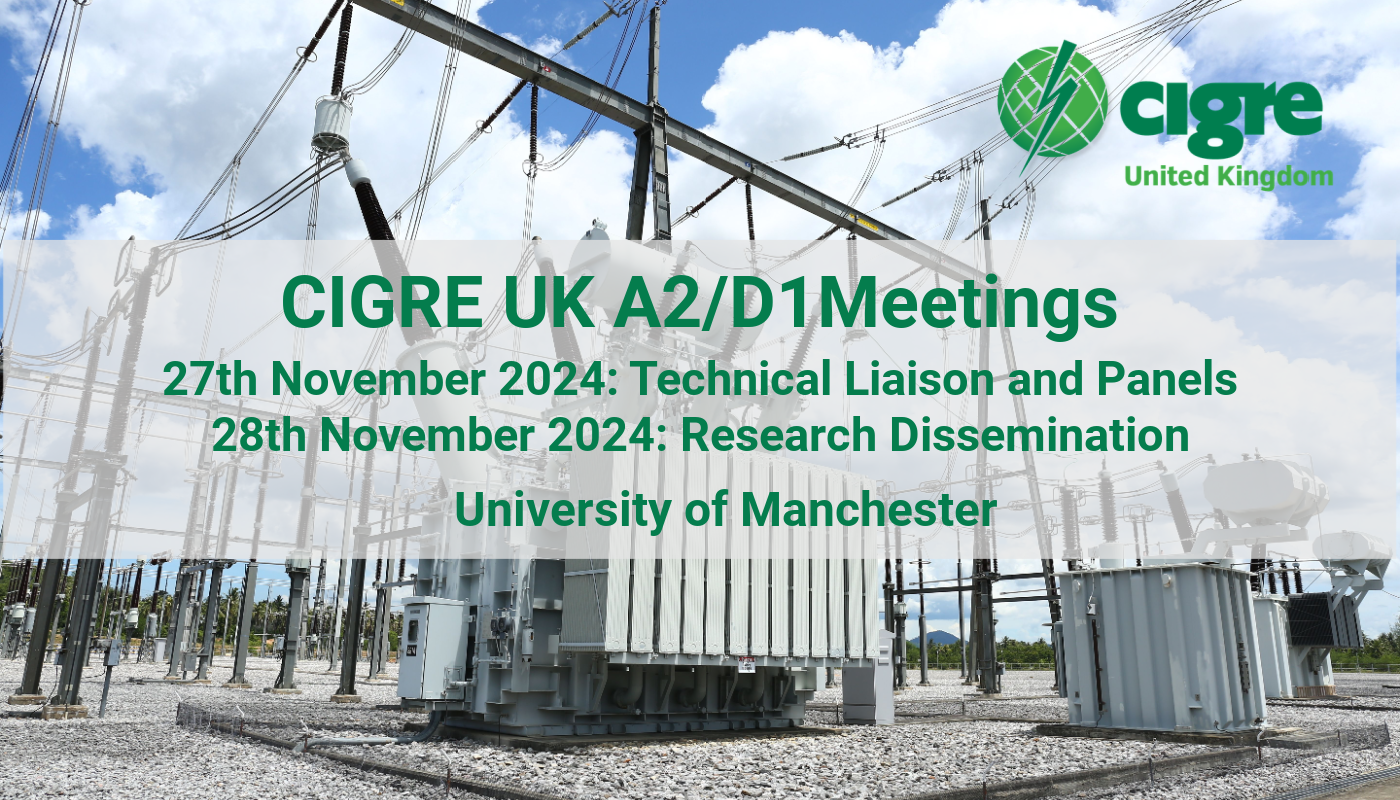
MEETING REPORT
CIGRE-UK held a two-day event on 27-28 November 2024 at the University of Manchester. The event was dedicated to exploring the latest developments in power transformers, reactors, materials and emerging test techniques.
The first day was scheduled for the technical liaison meeting between study committees A2 (Power Transformers and Reactors) and D1 (Materials and Emerging Test Techniques). A total of 52 attendees were treated to firsthand updates from international working groups on topics like transformer design, modelling, testing, digital twin and asset management. There was also a deep dive into two cutting-edge topics, which are life cycle assessment and dynamic thermal modelling. The day ended with an A2 technical panel meeting, with discussions around development of training courses to supplement existing tutorials for addressing a shortage of skills and talents in the industry.
The second day was planned for transformer research dissemination where a total of 37 people attended. There were 12 presentations from the industry and academia, covering areas of transformer thermal & electrical modelling, ageing dynamics & assessment, data analytics, end-of-life prediction and forensic investigation. The day was also a great platform for connecting seasoned professionals and next generation talents, as well as fostering valuable collaborations between industry and academia.
The next two-day event, with the same format, is scheduled for November 2025.
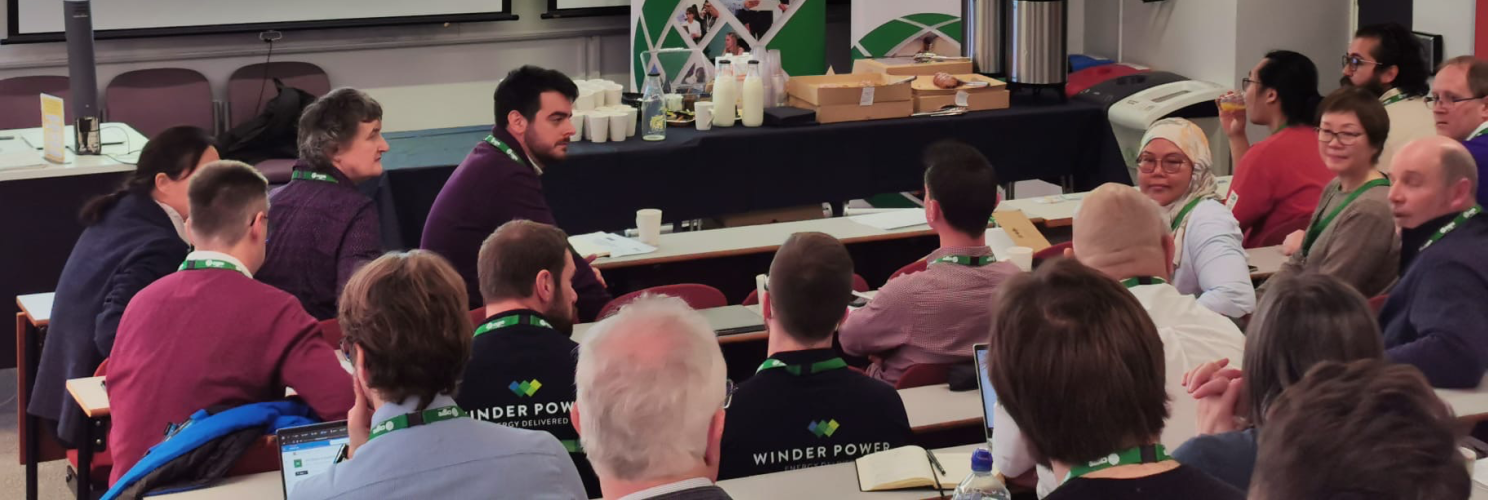
AGENDA
27 November 2024: A2|D1 Liaison Meeting & A2 Technical Panel Meeting
To view and download presentations click on this link: CIGRE A2D1 Liaison Meeting_Day1
10:30 – Registration & Tea/Coffee
11:00 – Welcome & Introduction to A2
11:15 – Technical Brochures, CIGRE 2024 Reflection, New WGs & Future Events, A2 Technical Activities & WG Updates
12:30 – Introduction to D1 and Updates from Relevant Technical Activities
13:00 – Networking Lunch
14:00 – Updates from IEC 60076 Parts 1 and 2 Revision
14:15 – In-Depth A2 Technical Presentation & Discussion
15:15 – Any Other Business
15:30 – End of Meeting & Tea/Coffee/Networking
15:30 – A2 Technical Panel Meeting (Closed Group)
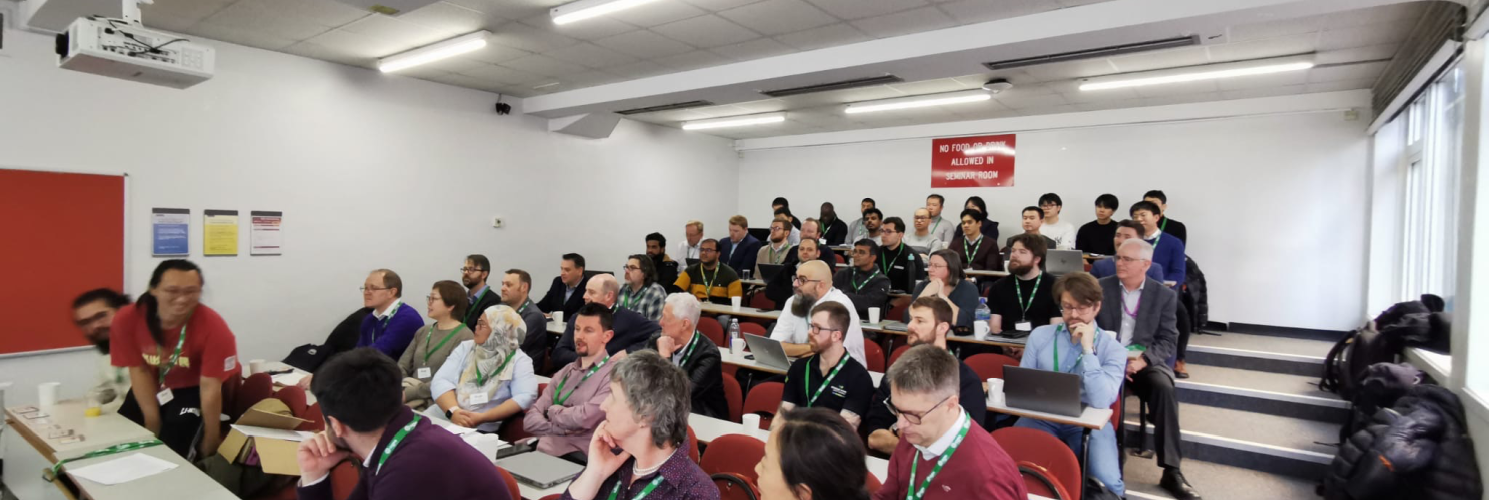
28 November 2024: Research Dissemination
To view and download the individual presentations please click the titles
10:00 Registration & Tea/Coffee
10:30 Industry and Academia Presentations
10:30 – 11:00 Transformer End-of-Life Prediction (Shanika Matharage, UoM)
This project aims to enhance understanding of transformer end-of-life through a combination of database analysis, modelling, and experimental activities. It emphasises transformer in-service ageing in the context of NGET network operational scenarios and seeks to develop an approach ready to implement in an asset management process using chemical markers in combination with other information to better determine the health condition of a transformer.
11:00 – 11:15 Unusual High Acidity in Distribution Transformers – Results Analysis (Dave Walker and Caleb Walker, SPEN)
SPEN discovered last year that they had an unusually high number of both secondary and primary transformers manufactured c30 years ago that have very high acidity, moisture and 2-Fal values. The assumption is that they were filled with poor oil from that period which was thought to have only affected its switchgear population. Nearly 20 transformers have been removed from the network and postmortems carried out and the findings may be of interest to the wider community.
11:15 – 11:30 Investigating the Use of Markers in Transformer Oil (Gordon Wilson, NGET)
The presentation will discuss the use of markers in transformer oil in particular focusing on using ester liquid as a marker to detect and quantify any leakage of liquid from either a diverter into a selector or main tank, or a selector tank through a barrier board into the main tank of a transformer.
11:30 – 12:00 Sustainable Power Transformers for An Uncertain Future (Thomas Andritsch, UoS)
We know there will be significant growth in demand for electrical energy and that climate change will impact on demand as well as security of supply. This talk summarises outcomes of projects that primarily focus on understanding certain failure modes and developing tools to assist with condition assessment of National Grids transformer fleet. This is built on existing TDHVL expertise in partial discharge, condition monitoring and electrical characterisation, with extensive collaboration with colleagues in the School of Chemistry.
12:00 – 12:15 Data Analytics for Transformer Dissolved Gas Analysis to Aid Asset Management (Zhongdong Wang, UoM)
This presentation summarises the outputs of one work package from transformer research consortium. It will discuss DGA database analysis and the development of an automated data analytical technique to objectively determine gassing trends.
12:15 – 12:30 Learning from Forensic Investigation of Gassing Wind Turbine Transformers (Hongzhi Ding, Doble)
There have been uncertainties about diagnosing abnormally high amounts of dissolved gases especially hydrogen (H2) in wind turbine transformers in terms of CIGRE TB 771:2019 and IEC 60599:2022, which remains a challenge. This short talk presents latest learning from forensic investigation of a gassing winding turbine transformer, confirming that knowledge from forensic examination is of vital importance in enabling better and credible interpretation of DGA results in wind turbine transformers.
12:30 Networking Lunch
13:30 Industry and Academia Presentations (Continued)
13:30 – 14:00 Thermal and Electrical Designs of Transformers by Considering Different Insulating Liquids (Qiang Liu, UoM)
This presentation summarises the outputs of two work packages from transformer research consortium. It will discuss some aspects of thermal and insulation designs of transformers when considering different insulating liquids, i.e. a conventional mineral oil, a GTL oil and a synthetic ester liquid.
14:00 – 14:15 Ageing Dynamics and Analysis of Power Transformers with Esters and Alternative Liquids (Thomas Andritsch, UoS) : this presentation is not available.
This project aims to investigate if additional paper ageing markers can be identified in transformer oil. We use modern chromatographic methods such as GCxGC-MS to analyse materials investigated in the IDEAL project to develop methods to better understand how power transformers with alternative insulating fluids differ in their ageing behaviour from NG’s “business as usual”.
14:15 – 14:30 Experiences with Retro-Filling 11kV Distribution Transformers (Dave Walker and Caleb Walker, SPEN)
SPEN has been retro-filling mineral oil distribution transformers with synthetic ester for nearly 20 years, in the last two years we have collected additional data from site for review and to improve our internal processes and retro-filling procedures. The results may be of interest to the wider community.
14:30 – 14:45 Thermal and Electrical Modelling for Cast Resin Dry-Type Transformers (Hang Xu, UoM)
Cast resin dry-type transformers are used as alternatives to liquid immersed transformers in applications with concerns of fire safety and environmental impact. This project focuses on digitalisation of the design process of cast resin transformer used in high voltage DC isolation applications.
14:45 – 15:00 Development of Thermal Models for Grid Transformers with Tertiary Windings Connected to BESS (Song Yang, UoM)
Tertiary windings of super grid transformers in transmission networks provide a cost-effective and efficient connection solution for BESS (Battery Energy Storage Systems). This presentation will talk about the development of thermal models for assessing the impact of BESS connection on transformer’s thermal performance.
15:00 – 15:15 Evaluation of the Effects on Electrical Losses and Thermal Ageing of Transformer Heat Recovery (Zhengbo Xu, UoM)
Direct heat recovery from grid transformers becomes an option when the heat demand is close to the transformers and the transformer can be run hot enough to provide heat at an acceptable temperature. This presentation gives the details of thermal model development and reports the effects of heat recovery on transformer losses and thermal ageing.
15:15 Reflection and Summary
15:30 End of Research Dissemination
A2 Study Committee Mission, Technology & Scope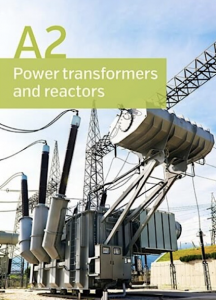 Mission
Mission
To facilitate and promote the progress of engineering and the international exchange of information and knowledge in the field of transformers and reactors. To add value to this information and knowledge by means of synthesizing state-of-the-art practices and developing recommendations.
Technological field of activity: Power transformers including industrial, DC converter and phase-shifting transformers; Reactors including shunt, series, saturated and, smoothing; Transformer components including bushings, tap changers and accessories
Scope: Within its technical field of activity, Study Committee A2 addresses topics throughout the asset management life-cycle phases; from conception, through research, development, design, production, deployment, operation, and end-of life. At all stages, technical, safety, economic, environmental and social aspects are addressed as well as interactions with, and integration into, the evolving power system and the environment. All aspects of performance, specification, testing and the application of testing techniques are within scope, with a specific focus on the impact of changing interactions and demands due to the evolution of the power system. Life cycle assessment techniques, risk management techniques, education and training are also important aspects.
Within this framework additional specific areas of attention include:
- Theory, principles and concepts, functionality, technological development, design, performance and application of materials, efficiency.
- Manufacturing, quality assurance, application guidance, planning, routing and location, construction, erection, installation.
- Reliability, availability, dependability, maintainability and maintenance, service, condition monitoring, diagnostics, restoration, repair, loading, upgrading, uprating.
- Refurbishment, re-use/re-deployment, deterioration, dismantling, disposal.
D1 Study Committee Mission & Scope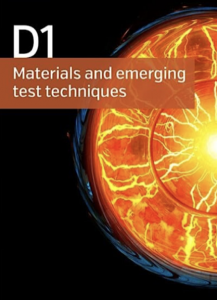 Mission
Mission
To facilitate and promote the progress of engineering and the international exchange of information and knowledge in the field of materials and emerging test techniques. To add value to this information and knowledge by means of synthesizing state-of-the-art practices and developing recommendations.
Scope: The activities of Study Committee D1 concern the evaluation and monitoring of the fundamental aspects of new and existing materials for electro-technology (conducting and insulating materials for electrical use); multi-component insulating arrangements with one or more electrical insulating materials used in conjunction with associated conducting parts; diagnostic techniques and related knowledge rules; emerging test techniques. Provision of timely information on new developments and trends in the field of materials and emerging test techniques to other Study Committees and support for their analysis of the introduction and application of these materials and techniques.
